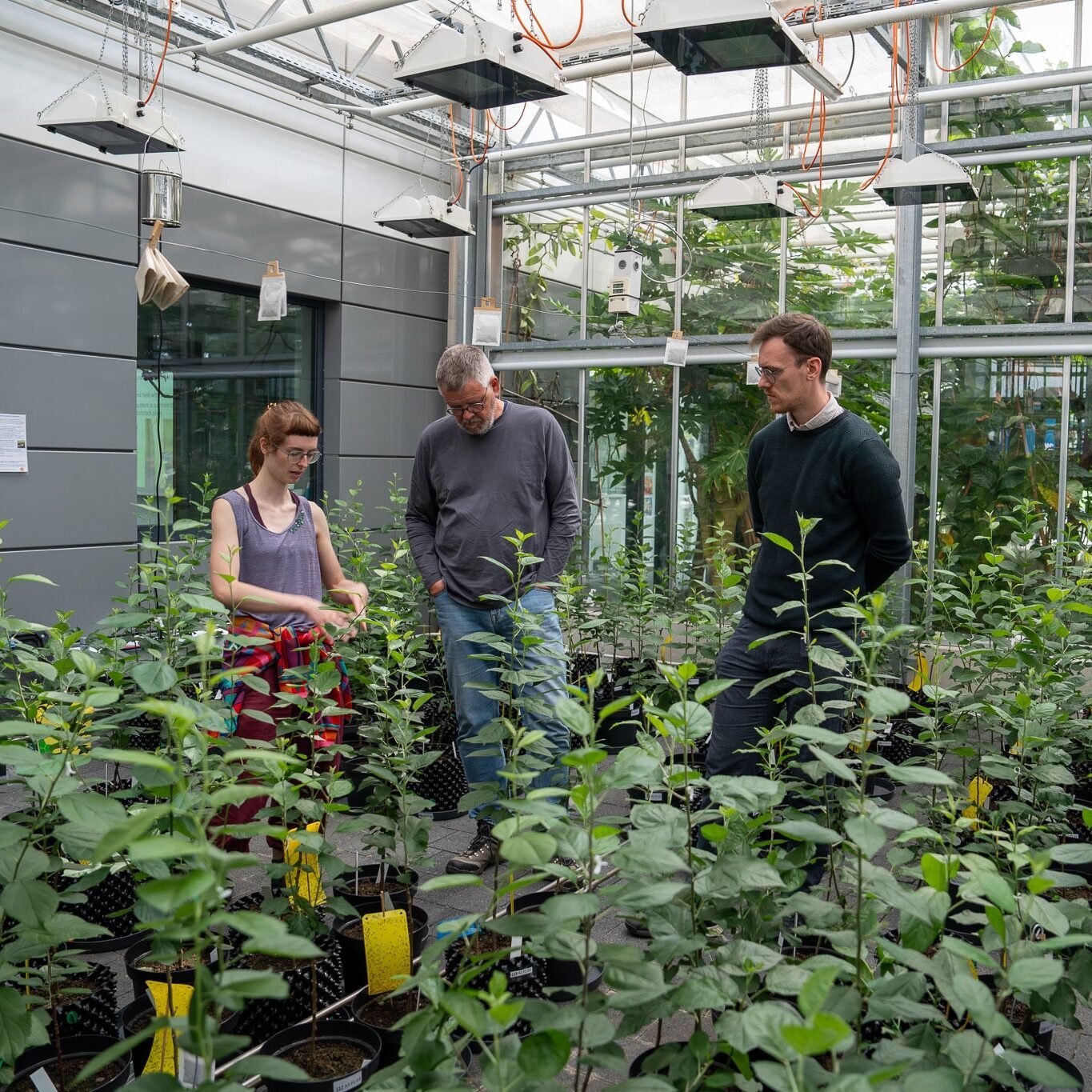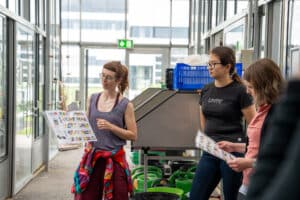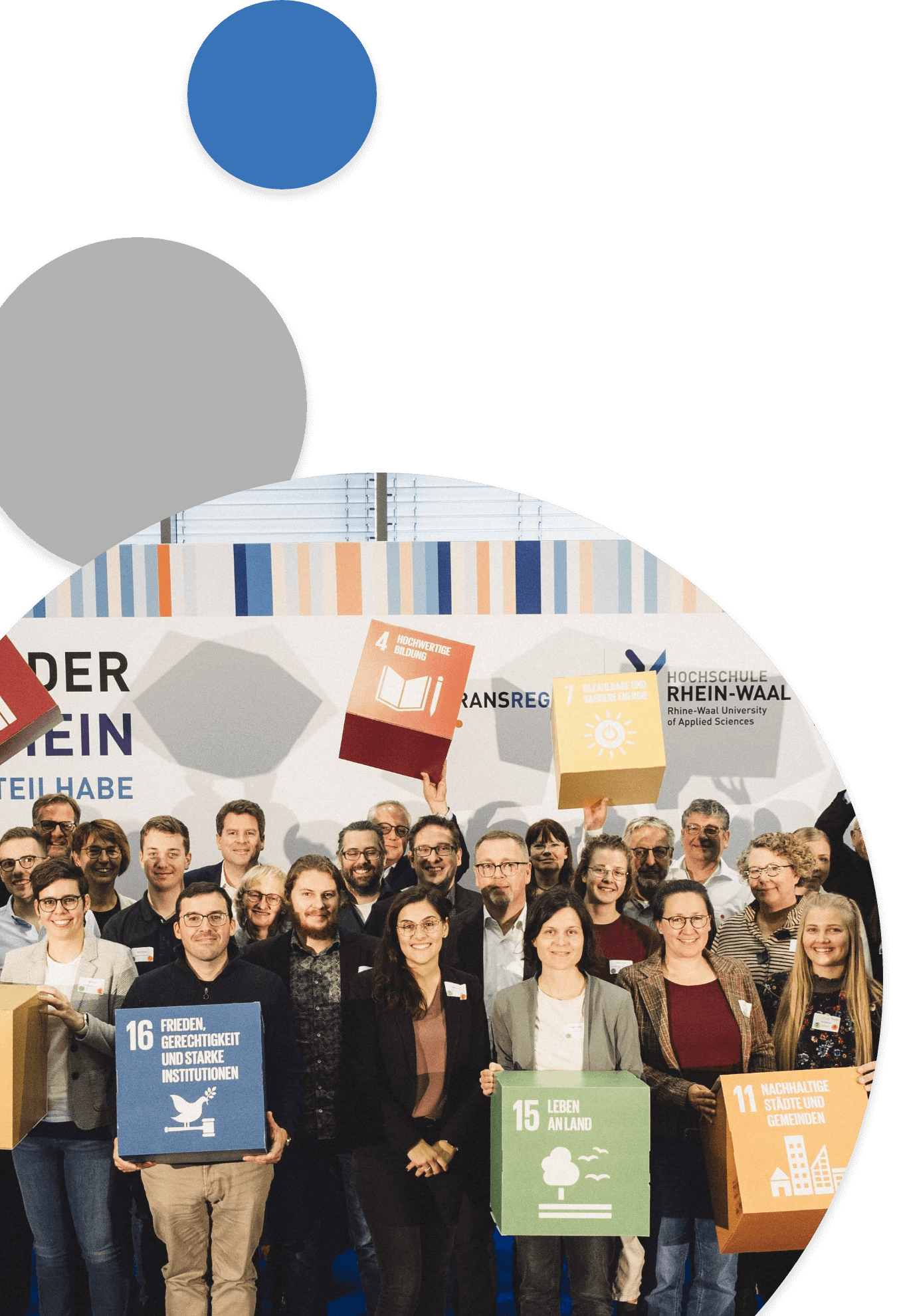
Practical research: In the search for drought-resistant rootstocks
In February, Anna-Lea Ortmann, PhD student, and Daiana Jambul, Master’s student, began their joint research project as part of the Agroforst Reallabor transformation project. They want to investigate how well six different apple rootstocks, the root system of apple trees, tolerate drought. Prof Dr Florian Wichern and Prof Dr Jens Gebauer are supervising the project.
Project presentation
To share the current status of the experiment, Anna-Lea Ortmann guided a small group of LiKK e.V. representatives, students and interested parties through the experimental setup in the tropical greenhouse with educational and show gardens. Anna-Lea Ortmann emphasises: “That’s the approach of our living lab. We work on research questions that are as relevant to practice as possible. This requires an exchange with practitioners, and not just once at the beginning and once at the end of an experiment. In between, many questions arise that are used to orientate the experiment. The exchange with other researchers or people who otherwise work on completely different topics often brings the necessary change of perspective and is very valuable.”
Aim of the research
By analysing various drought stress indicators, the apple rootstocks are compared in terms of their drought tolerance – an important characteristic in times of climate change and associated periods of drought. The research goal is to generate relevant findings that can be used directly by practitioners. The number of rootstocks analysed in the trial is limited to six different variants. In principle, a greater variety of rootstocks can help to make fruit growing more resilient in the long term. Greater diversity enables a more site- and system-specific selection of planting material and contributes to risk diversification. At the same time, more diversity also means more complexity. For example, if different apple rootstocks with different growth vigour are used within a fruit-growing agroforestry system, the management of the apple trees also becomes more complex, as they differ in terms of growth and pruning requirements, among other things.
Experiment setup and implementation
The drought stress experiment will be carried out during the course of the year in the tropical greenhouse at Rhine-Waal University of Applied Sciences. The rootstock varieties range from vigorous (Bittenfelder, Antonowka) to medium-growing (MM111, D2212) and weak-growing (M9, G214). A total of 264 one-year-old rootstocks were planted, half of which are grown in standard pots and half in air pots, in order to investigate the effects of air pruning on root development and drought tolerance. In the air pots, roots meet holes at the edge of the pot, whereas in standard pots they often grow in a circle along the edge, which impairs root growth. Due to the air contact in air pots, the roots branch out more finely, which improves the absorption of water and nutrients.
From the beginning of June, the irrigation of half of the apples is reduced by more than 50 % to initiate drought stress. This step is necessary to collect data on various drought stress indicators. In winter 2024/25, the experiment will be transferred to a field trial in which various combinations of rootstock and yield variety will be investigated after winter grafting.
Challenges and support
Conducting the trial in the tropical greenhouse at Rhine-Waal University of Applied Sciences makes it possible to control various trial conditions, above all the water supply to the plants. As expected, not all rootstocks took root well initially, but a buffer of additional plants was planned.
In terms of plant protection, biological pest control is used. Beneficial insects are used to prevent and control aphids. Fungal infestation is prevented with sulphur. While irrigation is currently still carried out manually and data on the irrigation quantity is collected, drip irrigation will be installed after the drought stress phase in the second half of the year.
Before, during and after the drought stress, data is collected on the growth of the rootstocks and on the chlorophyll content and photosynthesis performance of the leaves. Leaf samples are used to determine the content of various drought stress indicators, including proline (amino acid) and abscisic acid (plant hormone).
The experiment is supported by many parties. Doris Winkels, horticultural technician at the Tropical Greenhouse, provides support with her many years of horticultural expertise. Zhyldyz Oskonbaeva, a research assistant, is helping to analyse the drought stress indicator proline in the laboratory. Some of the analyses are made possible through cooperation with the University of Rostock and the University of Hohenheim. Without the commitment of the student assistants, it would not have been possible to carry out the experiment.
Prospects and partnerships
Despite the limitations of the short trial period of the tropical greenhouse experiment compared to the life of a tree, the researchers are optimistic. In the long term, the study of the rootstocks in the field is to be continued in order to investigate their medium to long-term development.
Jürgen Opschroef from LiKK e.V. is looking forward to the results of the weak-growing specimens and expects valuable insights for smaller orchards as well as for intensive orchards. There is also great interest in the vigorous rootstocks for orchards and high trunk trees. In terms of rootstocks, it is also interesting to look at vital old fruit trees on sub-optimal sites. These old fruit trees, also known as Methuselah trees, have defied the adverse conditions for decades and have survived several years of drought. These could provide indications of particularly resistant varieties that could be of great benefit for future plantings.
Research into the drought tolerance and diversity of apple rootstocks is an important building block in making apple cultivation more climate-resilient in the long term.




Kommentare